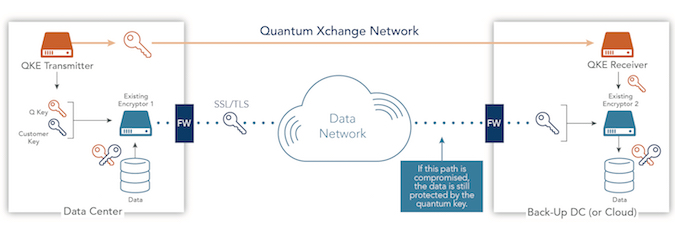Quantum Xchange Raises $10 Million, Launches Quantum Key Distribution Service
Bethesda, MD-based start-up Quantum Xchange has announced $10 Million Series A funding from New Technology Ventures, and the launch of the first commercial quantum key distribution (QKD) service in the U.S. The funding will support the deployment of a fiber network serving the Northeast Corridor from Washington D.C. to Boston, connecting the financial markets on Wall Street with back office operations in New Jersey.
The business premise is simple. The budding arrival of quantum computers will make current strong public key encryption immensely weak. Where current computing power would take too long or too many computers to make factoring large numbers feasible, one quantum computer could factor current public key lengths in a matter of minutes. Public key encryption will not provide security against quantum computers.
Quantum computing is not yet viable — but it is getting closer every month. Within the last fortnight (15 June 2018), Microsoft blogged, “Microsoft is ‘all-in’ on building a quantum computer and is making advancements ‘every day’.”
“Quantum computers,” explained Julie Love, director of quantum computing at Microsoft, “could solve a set of problems that are completely intractable to humans at this time, and it could do so in 100 seconds.” Microsoft is so confident in its progress that it has already released a Quantum Development Kit for developers.
Quantum Xchange’s president and CEO John Prisco told SecurityWeek that we cannot wait for the arrival of commercial quantum computing before we make plans to defend data in transit from quantum computing decryption. Sensitive data can be stolen and stored by both cyber criminals and nation states. While current encryption will keep that data safe from malicious eyes, within a relatively few years the encryption will be broken courtesy of qubit computing and become available to the attackers.
“Nation-states and other nefarious agents have been stockpiling encrypted data for years waiting for the arrival of technology to decode it,” warns David Monahan, managing research director at Enterprise Management Associates. “Quantum computers capable of breaking existing SSL encryption may only be a few years away. The time to prepare for this eventuality is now. Organizations without a well-articulated quantum risk management plan will fall behind, and lose business to, those that do.”
Quantum key distribution is the only provable way to keep encryption secure both now and in the future — even against the power of quantum computers. It works at the quantum mechanics level, using photons of light to transfer a shared secret between two entities via a fiber connection. The nature of photons means that they cannot be intercepted without disturbing the quantum state. If this were to happen, it would be detected and the communication abandoned. The protection is based on the laws of physics rather than the power of mathematics.
The Quantum Xchange network is simply a very secure communication system using complex quantum laws of physics. It only operates over dark fiber, which is plentiful in the U.S. Network service providers have been laying down more fiber than they currently require for years.
Quantum Xchange adds the distance enhancing Trusted Node technology developed by Battelle — which it exclusively owns — to quantum keys generated by QKD devices from ID Quantique — for which it has an exclusive U.S. licensing agreement. The combination, transmitted across plentiful U.S. dark fiber, allows the QKD range to be extended indefinitely in 100-mile multiples.

“ID Quantique’s QKD solutions have been working robustly in the field, securing Swiss elections for over a decade,” comments Gregoire Ribordy, CEO and co-founder of ID Quantique. “Other long-term customers include banks, governments and enterprises worldwide. Quantum Xchange’s model to provide end-to-end quantum keys on demand in the US will ensure easy accessibility for such customers to the highest levels of data protection, with inbuilt eavesdropping detection and forward security.”
Quantum Xchange is launching its QKD system in the U.S. north east, crossing the financial and government powerhouse of the nation from Washington D.C. to Boston. Its great strength, however, is that distance is no longer a problem, and the firm plans to spread the QKD network across the nation.
“Quantum computing is emerging, and the availability of large-scale quantum computers is on the horizon,” says Eric Hay, senior systems engineer at Quantum Xchange in a paper (PDF) published in March 2018. “The threat posed by quantum computing however, is here and now. QKD offers the most complete, secure solution that can be implemented today to secure data from the threat of quantum computing. Because the security is based on physics, not complex math, there is no threat from advances in computing, quantum or otherwise, that will break QKD.”
Related: Quantum Computing’s Threat to Public-key Cryptosystems
Related: NSA Eyes Encryption-breaking ‘Quantum’ Machine: Report













